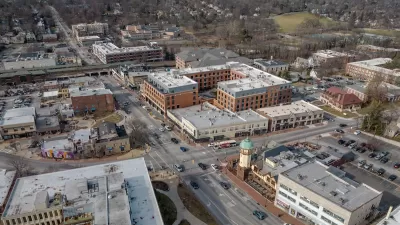In a recent paper, urban theorist Stephen Marshall rehashes Jane Jacobs's criticism of city planning as a pseudoscience built "on a foundation of nonsense." Can science and design be reconciled to provide planning a more stable foundation?
discusses the premise of Marshall's paper, published in Urban Design International, that echoes the 50-year-old critique by Jacobs. "The problem with urban design," says Marshall, "is that its theories are untested, yet accepted as fact. Marshall proposes to overhaul the way that urban design incorporates science into its fabric, calling for more and better urban science, and for the theories to be challenged with alternative hypotheses and rigorously tested."
While some agree, arguing that planners and designers could produce better outcomes by using better models, others such as Peter Laurence, an architect at Clemson University, debate whether the complexity of interactions and behaviors that make up the city could effectively be studied and predicted. "Geoffrey West, a physicist at the Santa Fe Institute who studies urban growth, agrees. People who study cities 'are dealing with maybe one of the most complex systems in the universe,' he says. 'The idea that you could reduce it to an equation is extremely hubristic.'"
"Marshall says that if urban designers don't build themselves a more scientific foundation, then outside researchers will do it for them," adds Fecht. "To survive, the field needs to incorporate scientific training into its educational curricula, and cultivate 'a concern for testing and validation, critical assimilation of scientific findings from disparate sources, and dissemination of the most reliable, up-to-date findings.'"
FULL STORY: Urban Legend: Can City Planning Shed Its Pseudoscientific Stigma?

Maui's Vacation Rental Debate Turns Ugly
Verbal attacks, misinformation campaigns and fistfights plague a high-stakes debate to convert thousands of vacation rentals into long-term housing.

Planetizen Federal Action Tracker
A weekly monitor of how Trump’s orders and actions are impacting planners and planning in America.

San Francisco Suspends Traffic Calming Amidst Record Deaths
Citing “a challenging fiscal landscape,” the city will cease the program on the heels of 42 traffic deaths, including 24 pedestrians.

Defunct Pittsburgh Power Plant to Become Residential Tower
A decommissioned steam heat plant will be redeveloped into almost 100 affordable housing units.

Trump Prompts Restructuring of Transportation Research Board in “Unprecedented Overreach”
The TRB has eliminated more than half of its committees including those focused on climate, equity, and cities.

Amtrak Rolls Out New Orleans to Alabama “Mardi Gras” Train
The new service will operate morning and evening departures between Mobile and New Orleans.
Urban Design for Planners 1: Software Tools
This six-course series explores essential urban design concepts using open source software and equips planners with the tools they need to participate fully in the urban design process.
Planning for Universal Design
Learn the tools for implementing Universal Design in planning regulations.
Heyer Gruel & Associates PA
JM Goldson LLC
Custer County Colorado
City of Camden Redevelopment Agency
City of Astoria
Transportation Research & Education Center (TREC) at Portland State University
Jefferson Parish Government
Camden Redevelopment Agency
City of Claremont





























